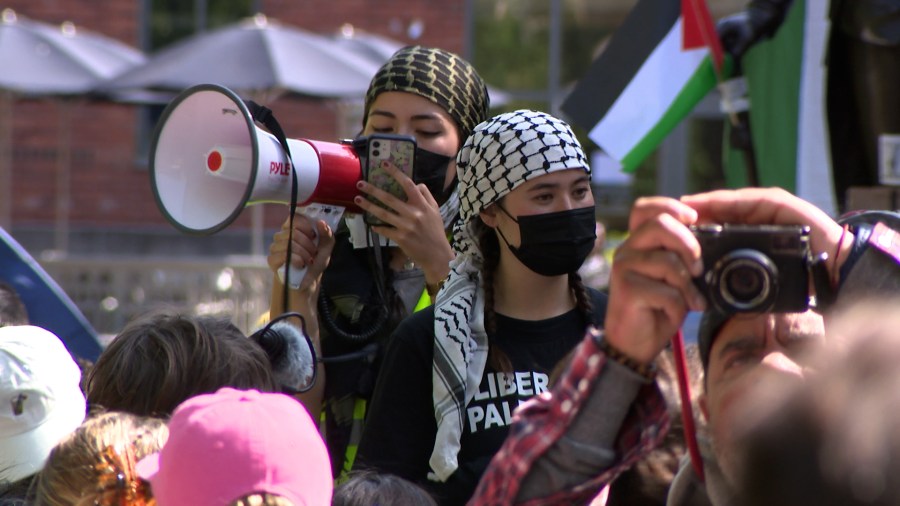Demonstrators at George Washington University continue to protest against the Israel-Hamas war by setting up an encampment at University Yard. Following similar protests at other universities, including Columbia University, the students faced warnings from university officials that the encampment went against university policy. Despite the threats of arrest, students like Moataz Salim decided to stay and continue their protest. Salim, a Palestinian-American, shared that he has family members in Gaza who have been impacted by the conflict and believes it is his duty to speak out for them, as they are voiceless.
The protesters were met with opposition from Jewish students on campus, such as senior Skyler Sieradzky, who found the encampment to be threatening. Sieradzky, wrapped in an Israeli flag, expressed pride in her heritage and solidarity with her family in Israel. Despite the tense atmosphere, both sides managed to endure the evening with hopes that the university would keep them safe. The protesters continued their rally on H Street, with Salim expressing the belief that the fear they felt was nothing compared to what people in Gaza were experiencing.
Despite being given notice about the potential consequences for trespassing on university property, the students were not arrested or removed from University Yard as of the evening. While there were concerns about safety and tensions between the protesters and Jewish students, both sides managed to coexist for the time being. Sieradzky voiced hope that the university would prioritize the safety of all students, including Arab and Muslim students, during the protest. It was a challenging and scary situation for both sides, but they continued to stand their ground in support of their beliefs.
The presence of the encampment and ongoing protest at George Washington University reflects a broader national trend of student activism in response to the Israel-Hamas conflict. The solidarity shown by students at various universities highlights the importance of raising awareness and advocating for marginalized communities affected by the conflict. The clash of perspectives, fears, and pride amongst the students involved underscores the complex nature of the situation and the emotional toll that it takes on those directly impacted by the conflict.
As the protest continued into the evening, the encampment and rally on H Street demonstrated the determination of the students to have their voices heard and to show support for those suffering in Gaza. Despite the potential consequences of arrest or suspension from school, many students, like Moataz Salim, were willing to face those risks in order to stand up for what they believe in. The clash of viewpoints and emotions between the protesters and Jewish students added another layer of complexity to the situation, underscoring the need for dialogue and understanding in the midst of passionate disagreements.
The presence of Jewish students like Skyler Sieradzky, who felt threatened by the encampment, highlighted the personal and emotional stakes involved in the protest. Sieradzky’s pride in her heritage and desire to stand in solidarity with her family in Israel added another dimension to the conflict, illustrating the deeply personal nature of the Israel-Hamas conflict for many individuals. Both sides expressed a desire for safety and understanding, despite their differences, emphasizing the need for empathy and open communication in addressing the complexities of the situation.
Overall, the ongoing protest at George Washington University serves as a microcosm of the broader conversation surrounding the Israel-Hamas conflict. The diverse perspectives, emotions, and experiences of the students involved highlight the complexities and challenges of addressing such a deeply rooted and multifaceted issue. The clash of beliefs and fears among the protesters and Jewish students underscores the importance of dialogue, understanding, and empathy in navigating contentious issues and promoting peace and justice for all affected by the conflict.


